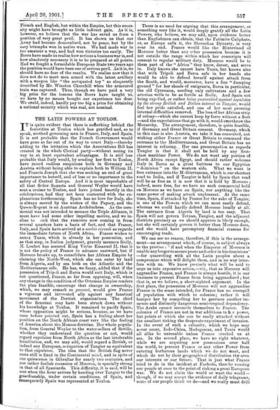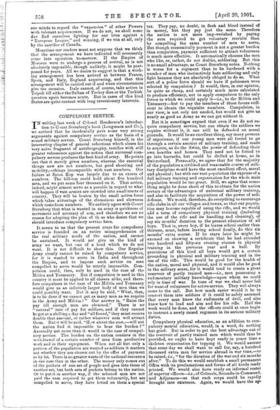THE LATIN POWERS AT TOULON.
IT is quite evident that there is something behind the festivities at Toulon which has gratified and, so to speak, soothed governing men in France, Italy, and Spain. It is not probable that the French Government would have gone so far out of .its way to court Italy—thereby adding to the irritation which the Associations Bill has created in the whole Clerical party—without seeing its way to at least equivalent advantages. It is still less probable that Italy would, by sending her fleet to Toulon, have raised endless suspicions both in Germany and Austria without being able to explain both to William II. and Francis Joseph that she was seeking an end of great importance to herself, and of less or no importance to the safety of Central Europe. And it is most improbable of all that Senor. .Sagasta and General Weyler would have sent a cruiser to Toulon, and have joined heartily in the celebrations, had they not been contented with the ex- planations forthcoming. Spain has no love for Italy, she is always moved by the wishes of the Papacy, and the Queen-Regent is an Austrian Archduchess. As the cere- monial was not intended to menace the Triple Alliance, it must have had some other impelling motive, and we in- - cline to link that the rumours now coming in from several quarters have a basis of fact, and that France, Italy, and Spain have arrived at a modus vivendi as regards the immediate future of North Africa. France wishes to annex Tunis, which is already in her possession, and as that step, in Italian judgment, gravely menaces Sicily, M. Loubet has assured King Victor Emanuel II. that it is not the policy of France to advance eastward, but if Morocco breaks up, to consolidate her African Empire by claiming the North-West, which she can enter by land from Algeria, and by sea both on the Atlantic and the Mediterranean side. He has, we fancy, added that if the possession of Tripoli and Barca would suit Italy, which is not questioned, France, so far from opposing, will, when any change in the condition of the Ottoman Empire renders the plan feasible, encourage that change in ownership, which, we may remark en passant, would give France a vigorous and interested ally against any fanatical 'movement of the Dervish organisations. The chief of the Senoussi may have been struck down without his knowledge at Toulon. It remained to pacify Spain, whose opposition might be serious, because, as we have once before pointed out, Spain has a feeling about her position on the North African coast very like the feeling of America about the Monroe doctrine. Her whole popula- tion, from General Weyler to the water-sellers of Seville, whether they understand the question or not, would regard expulsion from North Africa as the last intolerable humiliation, and, we may add, would regard a British, or indeed any European, occupation of Tangier as equivalent to that expulsion. The idea that the British flag never rests still is fjxed in the Continental mind, and in spite of our quiescence in Gibraltar for nearly two centuries, and our rather foolish recession of Minorca, is specially strong in that of all Spaniards. This difficulty, it is said, will be met when the hour arrives by handing over Tangier to the guardianship, under certain conditions, of Spain, and consequently Spain was represented at Toulon. There is no need for arguing that this arrangement, or something very like it, would deeply gratify all the Latin Powers, who believe, we may add, upon evidence better than Englishmen can obtain, that the Fatimite Caliphate, or, as Europe calls it, the Shereefian Dynasty, is very near its end. France would like the Hinterland of Morocco better than any other possession because it is not outside the range within which her conscripts will consent to regular military duty. Morocco would be to them part of the " Africa ' they know, detest, and serve in. Italy knows she cannot have Tunis, but knows also that with Tripoli and Berea safe in her hands she would be able to defend herself against attack from the South, and would, moreover, have a fine " dumping ground " for her shoals of emigrants, Barca in particular. the old Cyrenaica, needing only cultivators and a few artesian wells to be as fertile as Sicily. And Spain not being expelled, or rather being guaranteed against expulsion by the strong British and Italian interest in Tangier, would feel her pride satisfied, and one of her most pressing internal difficulties removed. The loss of her African strip of colony—which she cannot keep by force without a fleet —and the expectations that go with it, would overthrow the Monarchy. The arrangement, therefore, is quite feasible, if Germany and Great Britain consent. Germany, which in this case is also Austria, we take it has consented, not wishing either France or Great Britain to command the entrance to the Mediterranean, and Great Britain has no interest in refusing. Her one preoccupation as regards Tangier is that it . shall not be held by any first- class maritime Power. We do not want any portion of North Africa except Egypt, and should rather welcome Italy in Barca as a great buttress to our Egyptian " dominion " on the western side. What we want is free entrance into the Mediterranean, which is our shortest road to India, and if Tangier is held by Spain that road will be as free as it is now that it is held by Morocco ; indeed, more free, for we have no such commercial hold on Morocco as we have on Spain, nor anything like the same power of making attack unpleasant. At the same time, Spain, if attacked by France for the sake of Tangier, is one of the Powers which we can most easily defend, whereas we could hardly defend Morocco locally at all. The entrance from Algeria by land is too easy. That Spain will not govern Tetuan. Tangier, and the adjacent districts precisely as we should approve is likely enough, but she will certainly govern it better than Morocco does, and she would have peremptory financial reasons for encouraging trade.
We can see no reason, therefore, if this is the arrange- ment—an arrangement which, of course, is subject always to the proviso : • if and when the Emperor of Morocco is unable any longer to secure peace and order in his dominions' —for quarrelling with all the Latin peoples about a compromise which will delight them, and in no way inter- fere with us. We know precisely what will be said to urge us into expensive action,—viz., that as Morocco will aggrandise France, and France is always hostile, it is our business to prevent France from being aggrandised ; but that is, as we believe, a short-sighted argument. In the first place, the possession of Morocco will not aggrandise France in the sense intended, for France has no overspill of population with which to colonise; rather it will hamper her by compelling her to garrison another im- mense and distinctly dangerous semi-tropical dependency. The Arabs cannot reconcile themselves to France. The colonies of France are not in war additions to h-r power, but points at which she can be easily attacked without the assailant risking the desperate experiment of invasion. In the event of such a calamity, which we hope may never occur, Indo-China, Madagascar, and Tunis would all alike be untenable unless France crushed us at sea. In the second place, we have no right whatever, while we are acquiring new possessions over half the world, to prevent France or any other Power from entering barbarous lands which we do not want, and which do not by their geographic il distribution thr..aten our interests or our future. That is just what France tried to do in the incident at Fashoda, thereby rousing our people at once to the point of risking a great European war. We do not claim the world or want the world-r- theugh, if we may accept the evidence of daily telegrams, some of our people think we do—and we really must drill
our minds to regard the " expansion " of other Powers with tolerant acquiescence. If we do not, we shall some day find ourselves fighting for our lives against a " European League," and winning, if we win at all, only by the sacrifice of Canada.
Meantime our readers must not suppose that we think that the arrangement we have indicated will necessarily come into operation to-monow. If the Empire of Morocco were to undergo a process of revival, as is not absolutely impossible, though unlikely, it might be post- poned for years. All we desire to suggest is that a work- ing arrangement has been arrived at between France, Spain, and Italy, England acquiescing, and that this arrangement will be carried out if and when circumstances give the occasion. Italy cannot, of course, take action in Tripoli till either the Sultan of Turkey dies or the Turkish question again becomes acute. But in cases of this kind States are quite content with long reversionary interests.







































 Previous page
Previous page